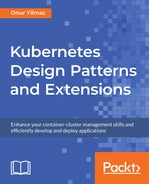In this chapter, extending Kubernetes was covered, where we enabled converting domain expertise into automation and intervening Kubernetes operations. Firstly, the extension points in Kubernetes were presented to show its built-in extension
capabilities. Throughout the chapter, new resources were added to the Kubernetes API, and their operations were automated so that Kubernetes can work for custom resources in addition to the built-in ones. Following this, resource creation logic was extended with dynamic admission controllers, and you were shown how to include operational requirements in the Kubernetes API resource life cycle.
Finally, configuring the scheduler of Kubernetes was presented to cover all extensive
requirements for nodes and inter-pod relations. How to write, deploy, and use a custom scheduler was also shown. With the extension capabilities included in this chapter, it is possible to use Kubernetes, not only as a container orchestrator, but as a
platform capable of handling all custom requirements of cloud-native applications.
In this book, Kubernetes design patterns and extensions were presented from their foundations to their implementations in a cloud-native microservice architecture. Firstly, in the first chapter, best practices for Kubernetes were covered. Design patterns and their reflections on the cloud-native architecture of Kubernetes were illustrated in order to create best practice knowledge. In the second chapter, how to connect to Kubernetes programmatically was presented. The hands-on activities on client libraries were aimed at being ready for the applications that communicate with Kubernetes. These Kubernetes API consuming applications will make a difference for utilizing Kubernetes and enable achieving more than a casual Kubernetes user. In the last chapter, Kubernetes extension points were covered. Kubernetes extension points enable converting domain expertise into automation and intervening Kubernetes operations. With the extension capabilities included in this last chapter, it is possible to use Kubernetes, not only as a container orchestrator, but as a platform capable of handling the complex requirements of cloud-native applications.
